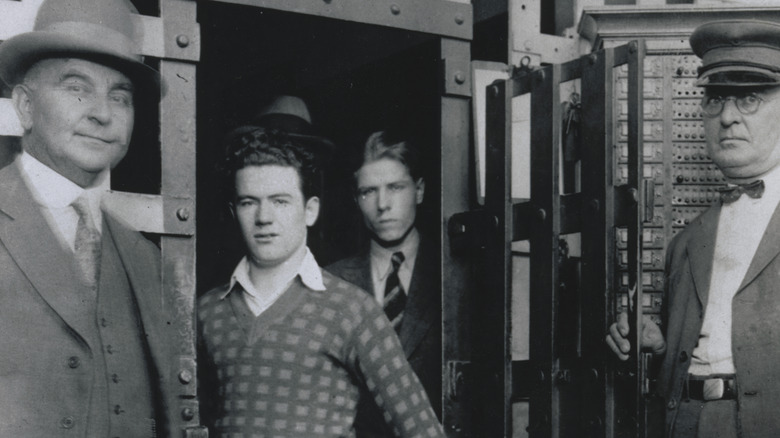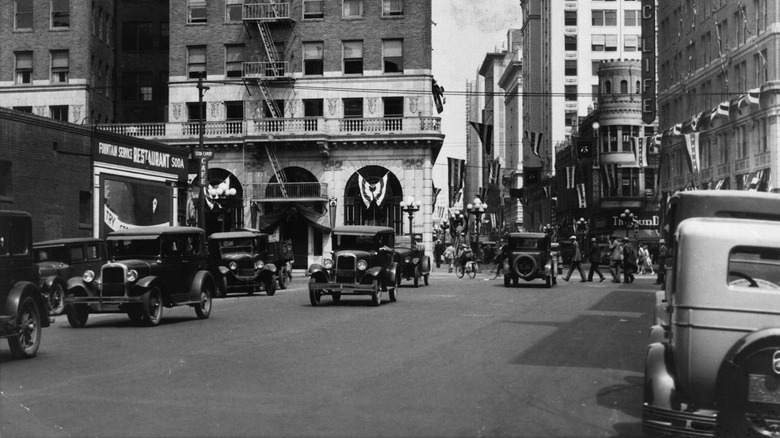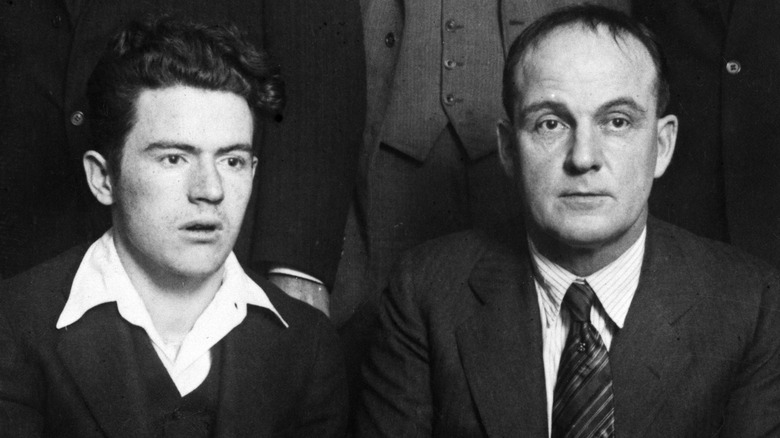What Marion Parker's Ransom Note Really Said
The murder of Marion Parker was described by the Los Angeles Times as "the most horrible crime of the 1920s." She was only 12 when she was kidnapped from her Los Angeles school on December 15, 1927. Two days later, her disemboweled and mutilated corpse was thrown out of a car after the kidnapper received $1,500 in ransom from her father Perry Parker, who was left to find his child's body. It was later determined that she had been killed shortly before the exchange of money. The murderer was William Edward Hickman, who was arrested a week after Marion disappeared. The 19-year-old had briefly worked at the same bank as Perry, who denied the teen reinstatement or a reference after an arrest for forgery. He attempted one of California's first insanity pleas, but he was convicted and hanged almost a year after his crime.
Hickman's brutal murder of a child was enough to shock and repel the nation, but before his identity was known and his horrible deed done, the case was already making headlines. For the two days he held Marion, Hickman sent a series of ransom messages to her father that were then published in newspapers. The first was sent on the evening of December 15. Perry, who had celebrated his 48th birthday that day, had grown worried that his daughter hadn't come home from school and was about to call the police when he received a telegram from Pasadena. "Do positively nothing till you receive special delivery letter," it read, with Marion's signature at the bottom. "Marion secure," it read (per "Butterfly in the Rain").
The ransom message included a note from Marion Parker
Upon receiving the first telegram concerning his daughter, Perry Parker sat tight and waited. He received another message, a telegram from Alhambra, that same night. This one read: "Marion secure. Use good judgement. Interference with my plans dangerous." It was signed "George Fox," one of several aliases William Edward Hickman would adopt over the next two days.
The next day, Hickman sent Parker a special delivery letter with his ransom demands. It was headed by Greek letters and made of several different styles of handwriting. The letter again warned Parker to use "good judgement" and ordered him to "[s]ecure seventy-five $20 gold certificates U.S. Currency 1500 dollars at once. Keep them on your person." He was told to keep the money on him and keep away from the police. "Fulfilling these terms with the transfer of currency will secure the return of the girl. Failure to comply with these requests means no one will ever see the girl again except the angels in heaven." Parker was given three days to comply, and the letter was signed "Fate."
As a postscript, Hickman included a message written by Marion Parker herself. "I wish I could come home," she wrote. "I think I'll die if I have to be like this much longer. Won't someone tell me why all this had to happen to me. Daddy please do what this man tells you or he'll kill me if you don't." A P.S. read: "Please Daddy I want to come home tonight."
Later ransom notes complained about police interference
Perry Parker followed the instructions from the ransom letter. He withdrew $1500 in $20 bills from his personal account at his bank and carried on with a regular workday on December 16. At 8 p.m. that night, he received a phone call at his house from the kidnapper, who told him to bring the money to a specified street. Perry hurried to comply, neither asking nor wanting police interference — he was prepared to pay the ransom to get his daughter back and leave justice for another day.
But Perry had already involved the police before receiving the demands, and they tailed him to the meeting point. William Edward Hickman realized that Perry had been followed and never showed himself. The botched attempt to catch the kidnapper brought the story into the public eye. Kidnapping was a major crime story of 1920s America, and Marion Parker soon made national news. With the heat turning up, Hickman sent Perry another letter, accusing him of collaborating with the police and furnishing the press with family photos. "Mr. Parker I am ashamed of you!" the letter read. "You'll never know how you disappointed your daughter. She was so eager to know that it would only be a short while before she would be free from my terrible torture and then you mess the whole damn affair."
Another letter from Marion was included. She wrote that the kidnapper had driven her by the family house and warned that her parents may never see her again. "Please Daddy," read the P.S. "I want to come home this morning."
The last two ransom notes didn't reveal Marion Parker's fate
Two more ransom notes were sent to Perry Parker, both on December 17. The first, topped again by Greek letters, was almost apologetic. After accusing Perry of collaborating with the police, the kidnapper now conceded: "I feel however, that you started the search before you received my warning, so I am not blaming you for the bad beginning." He warned Perry to "dismiss all the authorities before it is too late" and stressed that Marion Parker would die if the ransom was not paid. "Be sensible and use good judgment," the letter ended. "You can't deal with a mastermind like a common crook or kidnapper."
In the final letter, the Fox alias of past messages was explained: "Very sly you know. Set no traps. I'll watch for them." The kidnapper explicitly threatened to "handle the situation" with a Gillette razor blade if his demands weren't met. It ended the way all the letters had: "If you want aid against me ask God not man." A call that evening arranged another meeting. This time, the exchange was made — Parker handed over the money at gunpoint, watched his daughter's body get pushed out of the kidnapper's car, and fell into shrieks of despair when he saw what had happened to her.
William Edward Hickman would later confess that he killed Marion that day out of fear she might alert someone and lead to his capture. Dissecting her body was necessary, he said, to move her without suspicion. His ransom letters indicated none of this, but the detectives who handled his arrest noted how much he seemed to relish writing out his confession.



